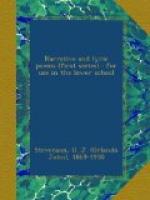III
High on the shore sat the great god Pan,
While turbidly flowed the
river,
And hacked and hewed as a great god can,
15
With his hard bleak steel, at the patient
reed,
Till there was not a sign of the leaf
indeed
To prove it fresh from the
river.
IV
He cut it short, did the great god Pan,
(How tall it stood in the
river!) 20
Then drew the pith, like the heart of
a man,
Steadily from the outside ring,
And notched the poor, dry, empty thing
In holes, as he sat by the
river.
V
“This is the way,” laughed
the great god Pan, 25
(Laughed while he sat by the
river,)
“The only way, since gods began
To make sweet music, they could succeed.”
Then, dropping his mouth to a hole in
the reed,
He blew in power by the river.
30
VI
Sweet, sweet, sweet, O Pan!
Piercing sweet by the river!
Blinding sweet, O great god Pan!
The sun on the lull forgot to die,
And the lilies revived, and the dragon-fly
35
Came back to dream on the
river.
VII
Yet half a beast is the great god Pan,
To laugh as he sits by the
river,
Making a poet out of a man:
The true gods[2] sigh for the cost and
pain,— 40
For the reed which grows nevermore again
As a reed with the reeds in
the river.
—Mrs. Browning.
[1] Pan. In Greek mythology, the god of pastures, forests and flocks. He was represented as half-man, half-goat, in appearance. He was the inventor of the shepherd’s flute.
[2] Pan was not one of the gods of Olympus, and was literally “half a beast.”
GRADATIM.[1]
Heaven is not reached at a single bound;
But we build the ladder by
which we rise
From the lowly earth to the
vaulted skies,
And we mount to the summit round by round.
I count this thing to be grandly true,
5
That a noble deed is a step
toward God—
Lifting the soul from the
common sod[2]
To a purer air and a broader view.
We rise by things that are under our feet;[3]
By what we have mastered of
good and gain; 10
By the pride deposed and the
passion slain,
And the vanquished ills that we hourly
meet.
We hope, we aspire, we resolve, we trust,
When the morning calls us
to life and light;
But our hearts grow weary,
and ere the night, 15
Our lives are trailing the sordid[4] dust.
We hope, we resolve, we aspire, we pray,
And we think that we mount
the air on wings
Beyond the recall of sensual
things,
While our feet still cling to the heavy
clay. 20
Wings for the angels, but feet for the
men![5]
We may borrow the wings to
find the way—
We may hope, and resolve,
and aspire, arid pray.
But our feet must rise, or we fall again.




